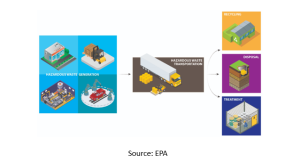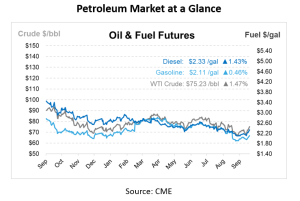
Waste Management: Are You Compliant?
As a fleet owner or automotive service provider, you recognize the importance of waste management in your operations. When it comes to disposing of used motor oil, oily rags, or even antifreeze, are you confident that you’re staying compliant with all the regulations? The landscape of waste disposal legislation is complex and getting it wrong can lead to costly consequences.
In today’s article, we’ll explore how you can stay on the right side of the law while keeping your business running smoothly.
What Legislation Affects You?
Laws like the Resource Conservation and Recovery Act (RCRA) and the Clean Water Act (CWA) directly impact how you manage and dispose of automotive waste. These regulations aren’t just about following rules—they’re about preventing environmental damage and protecting public health. For instance, used motor oil is considered hazardous waste, and improper disposal can lead to significant fines and legal trouble. Are you handling your waste streams in a way that ensures compliance?
State-specific regulations can add another layer of complexity. In some states, recycling used oil isn’t just an option—it’s mandatory. Key legislation includes:
- The Resource Conservation and Recovery Act (RCRA): EPA’s legislation sets the general framework for managing hazardous and non-hazardous waste. RCRA sets stringent requirements for the treatment, storage, and disposal of hazardous waste, such as used motor oil, oily rags, and absorbents. Compliance with RCRA ensures that businesses are properly handling and disposing of waste materials to minimize environmental risks. You can check EPA’s guide for proper handling of hazardous waste here.
- The Clean Water Act (CWA): This EPA’s law addresses water pollution and mandates that any waste, including oily water or grit traps, is treated properly before disposal. Businesses that release pollutants into surface waters must comply with permits to avoid contamination and penalties.
Are You Properly Handling Hazardous Waste?
It’s easy to overlook the smaller details in waste management. Regarding used filters, oily absorbents, or antifreeze, cutting corners isn’t an option. Improper disposal of these materials can lead to environmental contamination and legal repercussions.
If you’re unsure about how your business stacks up when it comes to waste management compliance, now is the time to act. For fleets or automotive service providers, waste management involves many waste streams, including:
- Used oil, oily water, oily rags
- Used filters, automotive and industrial
- Coolants, antifreeze, absorbents
- Used Antifreeze
- Waste gas and diesel
The EPA established a comprehensive regulatory program to ensure hazardous waste is handled safely from “cradle to grave.” This means managing the waste from the moment it is generated through transportation, treatment, storage, and final disposal. After the hazardous waste is produced, transporters can move it to facilities that recycle, treat, store, or dispose of it. Since transporters operate on public roads, highways, railways, and waterways, both the United States Department of Transportation’s hazardous materials regulations and the EPA’s hazardous waste regulations must be followed.

Remember, it’s not just about avoiding penalties; proper waste management reflects your responsibility as an operator. By ensuring compliance with the laws, you’re safeguarding your business and contributing to a sustainable future.
How Can You Reduce Risks?
Managing waste doesn’t stop at simply knowing the rules. Are you keeping up with regular inspections and audits? Having a strategy in place for ongoing compliance can save you from facing steep penalties down the road. For example, the EPA can impose fines of up to $50,000 per day for businesses that violate hazardous waste regulations. These fines can add up quickly and put a strain on a business’s finances.
If you are not sure if your company is compliant with the law, a qualified waste management company – such as Select Environmental – a Mansfield Service Partners Company, can be a valuable partner in this effort. By partnering with a reliable provider, you can focus on your business while they take care of the complexities of legislation.
Reliable waste management provider
For more than 30 years, Select Environmental has been a leading provider of environmental services in Texas, offering practical solutions to tackle customers’ waste disposal challenge. With a knowledgeable team ready to assist, we address all your regulatory and compliance needs, including hazardous waste transportation, disposal, waste-to-energy, and recycling solutions. Our extensive product range ensures that you remain environmentally compliant, whether it involves spill prevention and containment or keeping up with regulatory changes.
Select has the expertise to tackle your toughest environmental challenges, from tank cleaning and remediation to managing high-hazard and complex waste streams. Whether dealing with lab packs, containerized waste, or bulk solid and liquid streams, our comprehensive solutions provide cradle-to-grave support you can trust. With one call to Select, you schedule a single service call covering all your waste streams. Select’s experts will help you find a safe and compliant solution, assist with waste stream reduction and used oil disposal, and help you achieve your sustainability goals. Contact us today!


